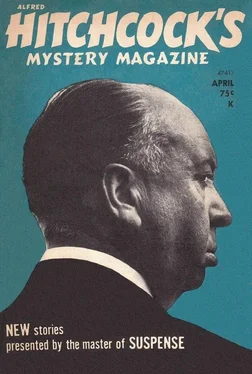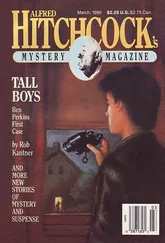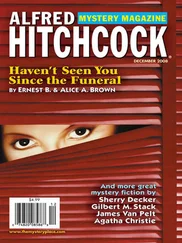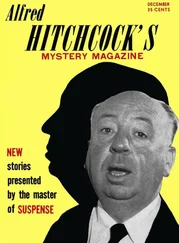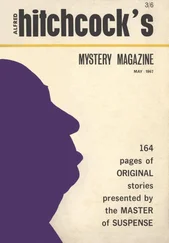Роберт Колби - Alfred Hitchcock’s Mystery Magazine. Vol. 17, No. 4, April 1972
Здесь есть возможность читать онлайн «Роберт Колби - Alfred Hitchcock’s Mystery Magazine. Vol. 17, No. 4, April 1972» весь текст электронной книги совершенно бесплатно (целиком полную версию без сокращений). В некоторых случаях можно слушать аудио, скачать через торрент в формате fb2 и присутствует краткое содержание. Город: Riviera Beach, FL, Год выпуска: 1972, Издательство: H.S.D. Publications, Жанр: Детектив, на английском языке. Описание произведения, (предисловие) а так же отзывы посетителей доступны на портале библиотеки ЛибКат.
- Название:Alfred Hitchcock’s Mystery Magazine. Vol. 17, No. 4, April 1972
- Автор:
- Издательство:H.S.D. Publications
- Жанр:
- Год:1972
- Город:Riviera Beach, FL
- ISBN:нет данных
- Рейтинг книги:5 / 5. Голосов: 1
-
Избранное:Добавить в избранное
- Отзывы:
-
Ваша оценка:
- 100
- 1
- 2
- 3
- 4
- 5
Alfred Hitchcock’s Mystery Magazine. Vol. 17, No. 4, April 1972: краткое содержание, описание и аннотация
Предлагаем к чтению аннотацию, описание, краткое содержание или предисловие (зависит от того, что написал сам автор книги «Alfred Hitchcock’s Mystery Magazine. Vol. 17, No. 4, April 1972»). Если вы не нашли необходимую информацию о книге — напишите в комментариях, мы постараемся отыскать её.
Alfred Hitchcock’s Mystery Magazine. Vol. 17, No. 4, April 1972 — читать онлайн бесплатно полную книгу (весь текст) целиком
Ниже представлен текст книги, разбитый по страницам. Система сохранения места последней прочитанной страницы, позволяет с удобством читать онлайн бесплатно книгу «Alfred Hitchcock’s Mystery Magazine. Vol. 17, No. 4, April 1972», без необходимости каждый раз заново искать на чём Вы остановились. Поставьте закладку, и сможете в любой момент перейти на страницу, на которой закончили чтение.
Интервал:
Закладка:
“That was this morning,” Fletcher said.
Leopold sat on the edge of the desk, close to the man in the chair. “Look, Neil, I think it’s time you told us the whole story. It’s not just robbery now — it’s murder.”
“Murder! I don’t...” He started to rise and Fletcher pushed him back in the chair.
“Hoffman passed those diamonds to someone, who delivered them to a fence and later killed the fence. You’re the only one who had physical contact with Hoffman after the robbery.”
“But I ran after him! I wrestled with him! I held him till the police got there! You know I did!”
“And while you were conveniently holding him, he slipped you the diamonds.”
“No! You’re crazy! I didn’t...”
Leopold began pacing the room. “There’s no other way it could have been. You have to be the accomplice, Quart.”
“Look, it doesn’t make sense! He was getting away! Why should there be this elaborate scheme to pass me the diamonds when he was getting away with them? If I hadn’t grabbed him, he’d have made good his escape.”
Leopold thought about that, trying to sort out the facts in his mind. What Neil Quart said made sense, too much sense. “Where were you tonight around seven o’clock?”
“Working in Bambaum’s shipping department, like every night. You can ask them.”
“All right,” Leopold said with a sigh. “Get out of here. Go on home. We’ll check it in the morning.”
Fletcher looked surprised. “But Captain...”
“It’s all right, Fletcher. I was wrong — again. This is my night for being wrong.”
Fletcher followed him back into his office. “Let me fix you some coffee, Captain.”
Leopold handed over the can. “I’ve lost it, Fletcher. I can’t even think straight anymore. I jump on some poor kid and try to make a murderer out of him. I get some guy killed for nothing.”
“You recovered the diamonds, Captain.”
“Yeah.”
Fletcher was filling the coffee pot. “Well, Hoffman sure did something with those diamonds. He had them when he hit Officer Begler, and he didn’t have them when they grabbed him a few minutes later.”
Leopold sat up straight. “How do we know that, Fletcher?”
“What? Well, hell, he sure didn’t crack Begler’s skull because he wasn’t carrying the diamonds.”
“Fletcher,” Leopold said very slowly, “I think that’s exactly what he did.”
They were waiting for Peter Arnold in the morning, when he unlocked the door of the Midtown Diamond Exchange. He glanced up, surprised, and said, “Captain Leopold! You look as if you’ve been up all night.”
“I have,” Leopold said, following him inside the store. Fletcher came too, but stayed by the door. “I’ve been getting people out of bed, checking on your finances, Arnold. I didn’t want to make another mistake.”
“What?”
“It was a damned clever plan, I have to say that. I suppose Rudy Hoffman thought it up, and then got friendly with some jewelers around town till he found one who needed the money.”
“I don’t know what you’re talking about.”
“I think you do, Arnold. You closed the shop at nine o’clock the other night, and quickly removed the diamonds from that window. Rudy Hoffman came by as scheduled, broke the window and ran. You pocketed the diamonds and called the police. Then you took the diamonds to Freddy Doyle, who was supposed to sell them. The plan had a great advantage — Hoffman didn’t have to spend precious seconds scooping up the loot in the window, and if he were arrested a block or two away, he’d be clean. No diamonds, no evidence. He probably planned to dump the cane and topcoat and keep on going. Only Officer Begler wasn’t where he was supposed to be, directing traffic. Hoffman knew it was too soon to be arrested — right by the window. He didn’t have the diamonds and the whole plot would be obvious, so he hit Begler with the cane and ran. That’s when he had more bad luck — a young fellow named Neil Quart chased after him. You had the diamonds all the time, but unfortunately Hoffman didn’t even have a chance to pretend he’d dumped them. We had an impossible crime on our hands, even though you didn’t plan it that way.”
Peter Arnold continued staring at them. He ran a damp tongue over his lips and said, “I assume you have some proof for all this?”
“Plenty of proof. You’re in bad financial trouble, and aiding in the theft of your company’s diamonds was an easy way out for you. We’ve got the gems back, and with you in jail I’m sure Hoffman can be persuaded to tell it like it was.”
“There were witnesses who saw Hoffman at the window, though.”
“Yes, but they only saw him reach inside. He would hardly have had time to scoop up all those loose diamonds, and only you, Arnold, actually said you saw him do that. You said you saw it while you were locking the door, even though there’s a velvet drape at the rear of the window that keeps you from seeing anything from inside the store. You didn’t see him take the diamonds because he never took them. They were already in your pocket when he broke the window and started running.”
“I don’t—”
“You panicked when Freddy called you, and especially when you saw me in the doorway with him. You recognized me, of course, and started shooting. That alone told me the killer was someone I’d questioned in connection with the case.”
Peter Arnold moved then, as Leopold knew he would. It was only a matter of guessing whether the murder gun was in his coat pocket or behind the counter. His hand went for his pocket, and Fletcher shot him from the doorway. It was a neat shot, in the shoulder — the sort Fletcher was good at.
Arnold toppled against a showcase, crying and clutching his shoulder, as Leopold slipped the gun from his pocket. “You should have dumped this in the river,” he said. “We could never have made the murder charge stick without it.”
Fletcher locked the front door and called for an ambulance. They had to get Arnold patched up, and booked for murder and robbery, and then they could both go home to bed.
The Missing Tattoo
by Clayton Matthews
Only by guarding what lies behind can there be safety from what may lie ahead.
The carnie night was a kaleidoscope of psychedelic colors and a riot of sound, the whoosh of the rides, the braying voices of concession-joint men and sideshow barkers, and over and under it all the merry tinkle of the merry-go-round calliope.
Bernie Mather, the front talker for the Ten-in-One freak show, was just beginning his bally, beating on a gong to attract attention, his voice pouring into the hand mike. “Hi, lookee, hi, lookee! Gather down close, folks, for a free show. Hi, lookee, this is where the freaks are!”
I stood on the edge of the gathering crowd before the freak show bally platform. It was going to be a big tip. Montana’s Wonder Shows was playing at a fair, and the crowds were satisfactorily large along the midway.
A passing carnie tapped me on the shoulder. “Hi, Patch. I see you’re still with it.”
“Yeah, I’m still with it.”
That’s me — Patch. Real name, Dave Cole, but to everybody on the Montana carnival I was Patch. To a carnie, a patch is exactly what the name implies. A fixer, the guy who greases the local fuzz, if grease is needed, to allow the games to operate openly and to permit the broads in the girlie shows to strip down to the buff. Oddly enough, considering the insular carnie world’s dislike of any and all fuzz, I also operated as a sort of law on the lot, keeping the peace, seeing that the game agents didn’t get too greedy, arbitrating disputes, whatever. In short, a carnie patch is a troubleshooter. In some ways I had more power around the carnie than Tex Montana, the owner, who paid my salary.
Читать дальшеИнтервал:
Закладка:
Похожие книги на «Alfred Hitchcock’s Mystery Magazine. Vol. 17, No. 4, April 1972»
Представляем Вашему вниманию похожие книги на «Alfred Hitchcock’s Mystery Magazine. Vol. 17, No. 4, April 1972» списком для выбора. Мы отобрали схожую по названию и смыслу литературу в надежде предоставить читателям больше вариантов отыскать новые, интересные, ещё непрочитанные произведения.
Обсуждение, отзывы о книге «Alfred Hitchcock’s Mystery Magazine. Vol. 17, No. 4, April 1972» и просто собственные мнения читателей. Оставьте ваши комментарии, напишите, что Вы думаете о произведении, его смысле или главных героях. Укажите что конкретно понравилось, а что нет, и почему Вы так считаете.
